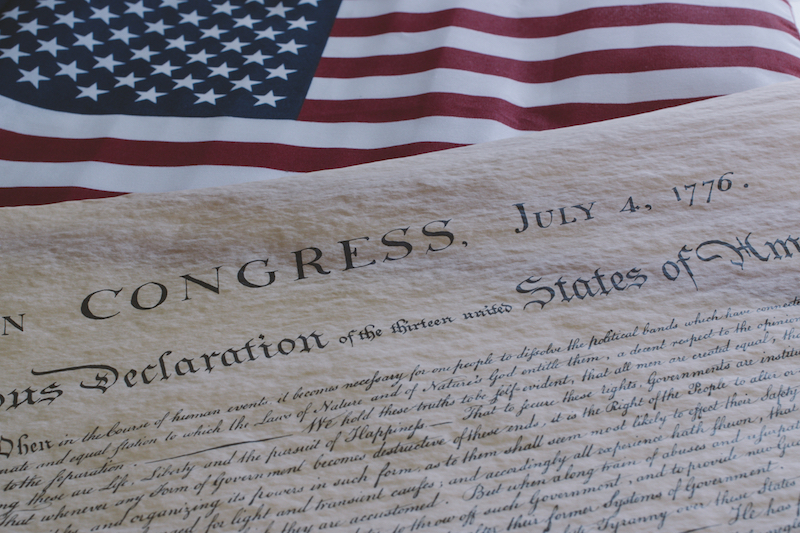Joe Carter is right: Christians should affirm the declarations of the Declaration of Independence when it comes to human rights and freedoms, without letting the document define our theology or buying into the myth of a Christian founding. But that point only raises a deeper question: Is the Declaration right that “these truths” are “self-evident,” such that all rational people—we and our non-Christian neighbors—can affirm them together? Or is special divine revelation the only “self-evident” truth, as much modern evangelical thinking presupposes?
The stakes in this question are high. If basic human rights really are self-evident, as the Declaration declares, there’s hope for religious freedom. But what then becomes of the necessity of Christ’s revelation? On the other hand, if only biblical revelation is truly self-evident, how is peace with our neighbors possible?
One way or another, much evangelical thinking about revelation will have to be reformed.
What Is ‘Self-Evident’?

First, we need to ask what the Declaration means by saying humanity’s natural rights and freedoms are “self-evident.” It doesn’t mean they can be deduced by some long, abstract chain of reasoning, starting from intuitive first principles and detached from tradition or moral experience.
Nothing in the Founders’ writings suggests they thought politics could be an exercise in Cartesian geometry. Quite the opposite; they appealed not only to reason but also to tradition and experience against divine right absolutism, which was itself a modern innovation seeking to overturn the medieval Christian natural rights tradition (which recognized a right to revolution against tyrants) in the name of an abstract theory.
I think George Will summarized the meaning of the phrase best in a talk I heard him give years ago. He said that when the Declaration calls its claims about humanity’s natural rights and freedoms “self-evident,” it means those claims are inevitably persuasive to all minds whose use of reason isn’t blinded by passions or prejudices.
Just as we must resist the temptation of the Christian founding myth, we must equally resist the temptation of the anti-Christian founding myth. The founders were influenced by the Enlightenment, but also by critics of the Enlightenment. And they were more influenced by Christianity than Gregg Frazer’s lopsided account allows.
The American founding was neither Christian nor anti-Christian. It was a complex and ambiguous mixture of Christian and non-Christian elements. That’s why it provides such fertile ground for thinking about the sources and possibilities of religious freedom in a pluralistic society.
How and Why Is Special Revelation Necessary?
Few doubt that self-evident claims exist, such as 2 + 2 = 4. But the question is more hotly contested when it comes to moral truths. Just how much does the darkened mind of the “natural man” understand about right and wrong?
From the Stoics of antiquity to the scientism of our day, there have always been worldly movements arguing the sufficiency of natural revelation for our moral needs. When those within the church embrace such thinking in an extreme way, it can become heretical, as in the case of Pelagianism. Less extreme but still serious theological errors, such as the Roman Catholic understanding of salvation, are also supported in part by the influence of this idea.
Against these views, we ought to hold that the natural light isn’t enough. It cannot change hearts and make us able to do good. And even our knowledge of good is darkened by sin.
At the same time, there’s a real natural light, and it does provide some knowledge of good and evil. Scripture teaches this point directly (Rom. 2), and it can be necessarily concluded from the fact that God holds all persons accountable for sin. They cannot be accountable if they don’t know right from wrong; there must be some natural knowledge before that knowledge can be “darkened” by sin.
The revelation of Christ is necessary, but the question is “necessary for what”? It’s necessary for salvation, and for the more complete understanding of right and wrong salvation entails. It’s not necessary, however, for moral accountability and for the common needs of civilized life. The gospel itself presupposes this much.
So we need not be afraid to acknowledge that some moral truths are, in the Declaration’s sense, self-evident. We ought to acknowledge it. Indeed, Tim Keller has written that the idea of human rights is a good entry point to start talking to people about the gospel!
What It Is vs. What It Means
The great challenge of religious freedom shouldn’t be establishing the basic claim that people have natural rights and freedoms. The fundamental claims here are, indeed, inevitably persuasive to all minds whose use of reason isn’t blinded by passions or prejudices. Our struggles in this area only show how much cultural ground we’ve lost to the dark powers of passion and prejudice.
No, the real challenge isn’t in establishing that these rights exist. It’s in establishing what they mean.
All minimally rational people do, in fact, agree that people have a “right to life.” But what does that statement mean? Our debates about abortion and bioethics show the interpretation of our rights isn’t as self-evident as their existence. The same applies to our rights to liberty and the pursuit of happiness.
It’s here that God’s revelation in Scripture separates us from our neighbors. That isn’t the only factor creating disagreement, of course. Cultural and other differences are also at work. But one of the major factors creating disagreement in the interpretation of our rights is that we’ve embraced the fuller revelation of right and wrong provided in Christ, and our neighbors have not.
These differences need not destroy society. Peter Berger is right that religious freedom depends on persons with diverse beliefs finding a “formula of peace” they can all affirm together. We can repudiate those—many of them wolves in sheep’s clothing—who claim they will “defend Christianity” by making war on our enemies, and instead work together in love with our non-Christian neighbors to find a formula of peace that will let us share this big, beautiful country.
We’re not guaranteed success if we try. We’re guaranteed failure if we don’t—and we’d better be sure we know how we’ll defend that decision when we stand in judgment before the Prince of Peace, who calls on us to, “so far as it depends on you, live peaceably with all” (Rom. 12:18).
Is there enough evidence for us to believe the Gospels?
 In an age of faith deconstruction and skepticism about the Bible’s authority, it’s common to hear claims that the Gospels are unreliable propaganda. And if the Gospels are shown to be historically unreliable, the whole foundation of Christianity begins to crumble.
In an age of faith deconstruction and skepticism about the Bible’s authority, it’s common to hear claims that the Gospels are unreliable propaganda. And if the Gospels are shown to be historically unreliable, the whole foundation of Christianity begins to crumble.


































